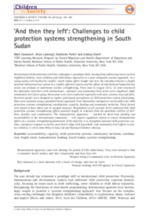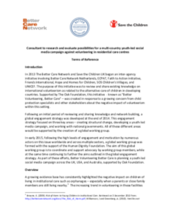Demographic Data
|
Sources: World Bank, UNICEF, UNDP HDR 2015, DHS 2011 |
Displaying 10511 - 10520 of 14391
The role of residential care for children has developed very differently internationally, but in all cultural contexts, there are questions about the extent to which it can help young people recover from high risk backgrounds. In the UK, residential care has come to be seen as the placement of last resort, yet new government guidance on permanence has suggested that residential care can provide security and a sense of belonging.
This editorial from the Toronto Star highlights the racial disproportionality in Toronto’s child welfare system and in child welfare systems across Canada.
This post is part of the Better Volunteering Better Care Initiative’s month-long spread of articles aimed at raising awareness around the issues of orphanage volunteering. This post introduces Better Volunteering Better Care’s position paper on orphanage volunteering and highlights some of the posts from the blogging blitz.
The Accelerating Strategies for Practical Innovation and Research in Economic Strengthening project (ASPIRES) is a USAID- and PEPFAR-funded cooperative agreement implemented by FHI 360 that supports evidence-based, gender-sensitive programming to
This video is part of the Better Volunteering Better Care Initiative’s month-long spread of articles aimed at raising awareness around the issues of orphanage volunteering. The 3-minute video summarizes the research on how and why orphanage trips are harmful to children.
The research in this study explores how systems strengthening approaches promoted by humanitarian agencies are perceived to have transpired in South Sudan during the country’s transition to independence.
This post is part of the Better Volunteering Better Care Initiative’s month-long spread of articles aimed at raising awareness around the issues of orphanage volunteering. The post explains the harms of orphanage tourism.
This consultancy project consists of a 3 month period to further research and develop plans for a youth-led media campaign in the UK, USA, and Australia.
This report includes a summary of each of the panel discussions at the symposium, as well as the questions asked, and provides the text of the opening and closing remarks from the event.
This study investigated the widely-used but under-researched program for training resource parents (i.e., foster, adoptive, or kinship parents) known as preservice PRIDE (Parent Resources for Information, Development and Education). The sample consisted of 174 participants in Ontario, Canada.




